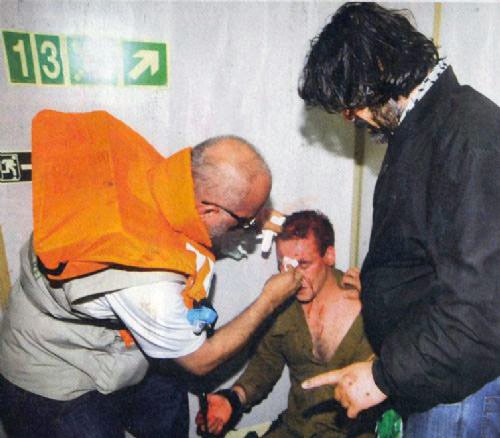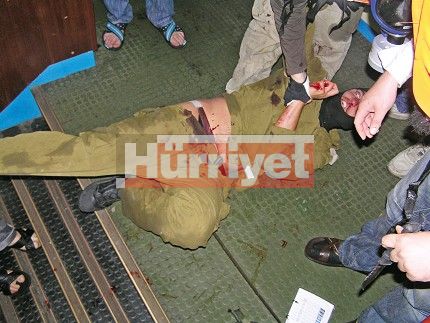
2030 GMT: Turkey's minister of energy and natural resources, Taner Yildiz, has announced that there will be
no new energy or water projects with Israel until relations between the two countries improve: "At a time when we are focused on the humanitarian aspects of what Israel did, we can't talk about commercial and economic matters. We won't start any project with Israel until relations with them have been normalized."
NEW Gaza Flotilla: Israel "Passengers Linked to Hamas, Al Qa'eda, Terrorist Organisations"
Turkey Inside Line: Erdogan Roars at Israel, Extends His Hand to Iraqi Kurdistan
Gaza Flotilla LiveBlog (5 June): Israel Forces Board the Rachel Corrie
1920 GMT: A group of senior Israel Navy officers
have publicly called on Prime Minister Benjamin Netanyahu and Defense Minister Ehud Barak to establish an independent and external commission of inquiry to investigate the Mavi Marmara raid: "We believe that the operation ended in a disaster on a military and diplomatic level," the reserve officers who served as commanders of Navy ships wrote in the letter.
1845 GMT: We have posted,
in a separate entry, the dramatic press release from the Israeli military that five of the passengers of the
Mavi Marmara are linked to Hamas, Al Qa'eda, and other "terrorist organisations".
1815 GMT: This Should Be Interesting. Israel's Foreign Minister Avigdor Lieberman, not noted for diplomatic subtlety, is reportedly
planning to meet "with envoys and representatives of Israel, and Jewish communities in the US and Canada, to explain the Israeli government's position on the flotilla affair".
There are no indications Lieberman will meet US Government or UN officials during the trip.
1650 GMT: It appears that, contrary to earlier reports (1105 GMT), Israel will reject the UN's proposal of an international enquiry into the attack on the
Mavi Marmara. Michael Oren, Israel's Ambassador to the US, has told Fox News, "We are
rejecting an international commission. We are discussing with the Obama administration a way in which our inquiry will take place."
Mark Regev, the Israeli Government's primary spokesman, has just repeated the line on CNN.
1639 GMT: The Battle of the Photographs. We noted in our initial update (1045 GMT) that defenders of the Israeli military action have been circulating a photograph, taken from the Turkish newspaper
Hurriyet, that they claim shows passengers attacking an injured Israeli soldier.
Defenders of the Flotilla are now pointing out that the one picture is out of context
: the full set of nine photographs from Hurriyet, Turkish newspapers, and other sources show the Flotilla's activists caring for Israeli troops (see inset photograph).
1635 GMT: The Free Gaza Movement reports that the five Irish passengers from the
Rachel Corrie have been deported and
will return to Ireland tomorrow.
1615 GMT: Israel has
deported eight Flotilla activists to Jordan. Seven are from the
Rachel Corrie; the eighth is an Indonesian who was injured in the attack on the
Mavi Marmara.
No word on the other passengers of the
Rachel Corrie.
1545 GMT: Blame Turkey, An illuminating clash in approach between two of America's largest newspapers: while
The New York Times has an analysis noting
the re-assessment amongst some US insiders of the relationship with Israel,
The Washington Post's editorial team
directs its fire at Ankara:
Western governments have been right to be concerned about Israel's poor judgment and botched execution in the raid against the Free Gaza flotilla. But they ought to be at least as worried about the Turkish government of Recep Tayyip Erdogan, which since Monday has shown a sympathy toward Islamic militants and a penchant for grotesque demagoguery toward Israel that ought to be unacceptable for a member of NATO.
1230 GMT: Eyewitness Testimony. Journalist Abbas Al Lawati, who was aboard the Mavi Marmara, has posted
the third part of his account, focusing on his interrogation by Israeli authorities.
1210 GMT: Israeli Foreign Ministry officials have said that
West Jerusalem not apologize to Turkey for the deaths of eight Turkish and 1 Turkish-American activists on the
Mavi Marmara.
A "top official"laimed that the Turkish demand for an official apology was mainly an excuse to allow Turkish Prime Minister Recep Tayyip Erdogan to cut diplomatic ties with Israel.
The Foreign Ministry officials said they were surprised by the request for an apology from Turkey's Ambassador to the US, Namik Tan, who "was known to be a supporter of Israel".
(Hmm.... If a "supporter of Israel" is calling for the apology, I would think that Israeli officials might consider how serious the diplomatic situation has become.)
1130 GMT: The New Israeli Line. Speaking at the opening of a Cabinet meeting,Israeli Prime Minister
Benjamin Netanyahu has announced, ""Evidence shows separate group of violent Islamists boarded flotilla....[They] boarded the ship at a separate port, did their own provisioning, and were not subject to the same security check of their luggage as all the other passengers.”
The Israeli Defense Forces are briefing the press that a group of about 50 men of the 700 on board the Mavi Marmara were trained fighters recruited from the northwestern Turkey city of Bursa. None had ID cards or passports; each carried an envelope with $10,000 in cash.
1105 GMT:
Ha'aretz reports that UN Secretary-General Ban Ki-moon has given Israel
a proposal for an international committee of inquiry into the raid on the
Mavi Marmara. The newspaper says that senior Israeli officials are recommending a positive response because Turkey will probably oppose it.
The committee would be headed by former New Zealand Prime Minister Geoffrey Palmer, an expert on maritime law, and include representatives from the US, Turkey, and Israel. Ban made the proposal in a phone call to Israeli Prime Minister Benjamin Netanyahu.
1045 GMT: The immediate tragedy and dramas of two Israeli boardings of Freedom Flotilla ships may be over, but there is still a lot of uncertainty and political tension about today.
Israel's official line is that most of the activists from the
MV Rachel Corrie, the ship seized by the Israeli military yesterday and towed to Israel's port of Ashdod,
will be deported.
The Free Gaza Movement, however, says, "
Nothing from the kidnapped passengers. [Nobel Prize laureate] Mairead [Corrigan]'s husband said no contact with her. Israel refuses to allow lawyers to talk to them."
The battle of words and pictures also continues. There are claims that Israel
altered the audio on supposed communications with the
Mavi Marmara (see Friday's updates for the Israeli version of the exchange), the ship attacked on Monday, to create the impression of passengers shouting insults such as "Shut up, go back to Auschwitz".
And discussion is heating up over photographs in
Hurriyet, the Turkish newspaper, showing an injured Israeli commando surrounded by passengers of the
Mavi Marmara.

 Thursday, June 24, 2010 at 14:10
Thursday, June 24, 2010 at 14:10  On Wednesday, the Southeast European Cooperation Process (SEECP), meeting in Istanbul, issued a joint declaration: "We deplore the loss of life and injuries during the incident in international waters", a reference to Israel's raid on the Freedom Flotilla on 31 May. The 13-member-organization also stated that it wants "an impartial, independent and internationally credible investigation on this matter".
On Wednesday, the Southeast European Cooperation Process (SEECP), meeting in Istanbul, issued a joint declaration: "We deplore the loss of life and injuries during the incident in international waters", a reference to Israel's raid on the Freedom Flotilla on 31 May. The 13-member-organization also stated that it wants "an impartial, independent and internationally credible investigation on this matter".



